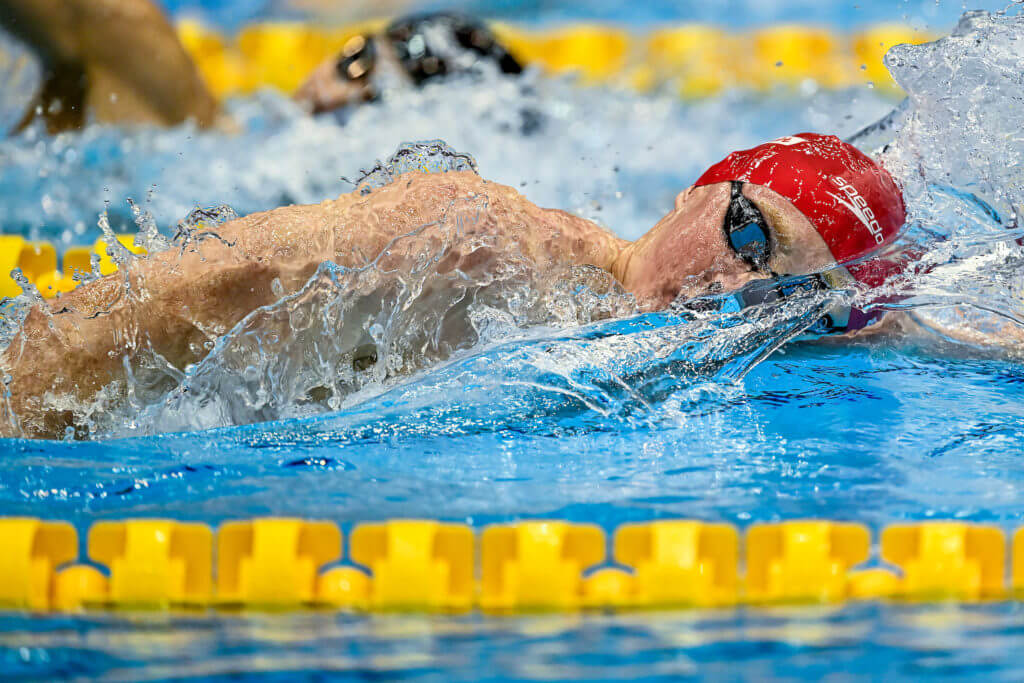After Fukuoka, What’s At Stake at 2024 Worlds in Doha?; The Relay Dilemma

Editorial content for the 2023 World Aquatics Championships is sponsored by FINIS, a longtime partner of Swimming World and leading innovator of suits, goggles and equipment. After Fukuoka, What’s At Stake at 2024 Worlds in Doha? This year’s World Championships marked the first time since 2019 that there was a nearly normal, all-inclusive championship meet. The Tokyo Olympics were rescheduled by one year and then dominated by the realities of the COVID-19 pandemic, while the 2022 Worlds were held in June to accommodate a busy international calendar and many top swimmers skipped the meet. The Fukuoka meet, almost exactly one year out from the Paris Games, followed a normal pattern, even if several top names (such as Kristof Milak and Adam Peaty) withdrew and did not travel to Japan. So full speed ahead now to Paris? Not exactly. For the first time ever, there will be a second World Aquatics Championships less than one year after the previous edition of the meet. In the last post-pandemic ripple on the international calendar, another two-week meet featuring all aquatic sports will take place in Doha, Qatar, next February. However, in the midst of the pre-Olympic training cycle, a large percentage of elite swimmers are expected to skip the meet to focus on their Olympic preparation. Yes, world titles and medals will be at stake, but many athletes and coaches will likely choose to forgo those opportunities and prioritize the more-prestigious Olympics. Swimmers currently racing in NCAA programs, including many top American stars along with world champions Leon Marchand, Ahmed Hafnaoui and Hubert Kos, would have a decision to make about whether to prioritize Worlds or their college championship season. However, some countries will be obligated to assemble stronger teams to ensure their qualification for Paris in relays. Typically, the top 12 finishers in each relay from the previous year’s World Championships book their tickets to the Olympics, with four other teams being selected based on times from other meets. But with two Worlds scheduled for 12 months, World Aquatics unveiled a plan where only the top three teams at the Fukuoka Worlds would automatically qualify, with the other 13 teams chosen based on results in Doha. Later on, World Aquatics updated the plan so that the remaining 13 squads in each event “will qualify on the basis of the fastest times from the preliminaries and finals performances of both the World Aquatics Championships Fukuoka 2022 and the World Aquatics Championships Doha 2024.” That introduced more flexibility, but only the medalists from Fukuoka are 100% safe for Tokyo. Hence, the countries in the best position right now are the United States and Australia. Both nations earned medals in all relays in Fukuoka, eliminating any concerns about the upcoming February meet. USA Swimming National Team Managing Director Lindsay Mintenko told Swimming World last year that her organization’s approach would depend on what was needed for relay qualification, but that is no longer a concern after the recent medal-winning results. “The people who want to go will go, and we’ll send a team,” Mintenko said, but she did not plan on hosting a dedicated selection meet. British swimmers have been among the most vocal in opposition to the idea of an early 2024 Worlds, with Peaty, James Guy and coach Mel Marshall all expressing their disapproval of the meet. Ironically, Great Britain might be the country now under the most pressure to perform in Doha. The British men were among the gold-medal favorites in the 400 freestyle relay, but they were disqualified, necessitating a swift-enough time in Doha to book a Paris spot. The British men’s 800 free relay is safe after earning gold in Fukuoka, but the medley relay, silver medalists in Tokyo, was fifth. Italy will also need to send some of its top swimmers to Doha, although distance star Gregorio Paltrinieri already hinted at his own attendance after scratching his signature event, the 1500 free, in Fukuoka. Italy only reached the podium in one relay, the men’s 400 free, with the men’s medley missing the final after entering as defending world champion. Meanwhile, falling from second to fourth in the men’s medley could prove tricky to France. Would the French federation ask Marchand to attend the Doha meet to ensure the medley and other relays gain a spot for a home Olympics? Such an around-the-world trip would interrupt Marchand’s junior season at Arizona State University and his preparation for Paris. On the women’s side, Canada will surely want to record some strong relays after only winning a medal in the medley relay in Fukuoka. Penny Oleksiak’s return to major competition would provide a huge boost and likely place the Canadians into medal contention in every relay for Paris. Sweden might also be concerned about ensuring a relay presence for Sarah Sjostrom’s fifth Olympics. In addition to relay implications, the remaining 19 out of 22 spots in the open water 10K races for Paris will be filled in Doha. Similar to the relays, only the top-three finishers among women and men qualified, with Germany’s Leonie Beck, Australia’s Chelsea Gubecka and the United States’ Katie Grimes making it on the women’s side while German men Florian Wellbrock and Oliver Klemet were joined by Hungary’s Kristof Rasovszky.







I would have thought France would get automatic qualification in the relays considering they’re the home nation and crowd needs someone to cheer for. This is the standard in many other sports where the French dont normally excel or qualify in.
I’ve been wondering about how an early 2024 Worlds will go, and whether a number of top swimmers might skip it. I hope they don’t: Maybe it’s not obvious to today’s generation of swimmers, but in an earlier age there was a terrible dearth of global championships – the 1980 Olympic boycott was so devastating because it meant four years of no global championship, and basically a generation that didn’t get to compete when at their peak. Now there’s the opposite “problem.”
Swimmers to some extent are their own worst enemy – the world treats the Olympics as the only swim meet that matters, and so, unfortunately, do a lot of swimmers. I get skipping the Worlds for mental health or burnout, but the Commonwealths? Seriously? You also hear it in the TV coverage, with NBC often referring to Fukuoka as a warm-up for Paris and not once, from what I could tell, mentioning Doha. The World Championships should be as big a deal as the Olympics. Tennis and golf have four events each year that matter; swimming these days has three every four years, and even that is a big increase over historical numbers. Now, thanks to COVID, there are six global meets from 2021-25. Admittedly, I’m not a swimmer, I don’t do the training and don’t have to think about how to peak for the big moments. But having more events when the top people face each other in races that matter would seem to be a good thing for the sport.
Some big swimmers are in danger of looking like prima donnas. Won’t even get outta bed for the Worlds….
Agree 100%.
Wholst only the Fukuoka relay medallists have officially locked in their Paris spots; the reality is that top 5 finishers, and almost certainly all finalists are essentially safe.
It will be those with DQs or who misjudged their heats (GBR M4X100/GBR W4XMED/ITA M4XMED) needing trips to sunny Doha.